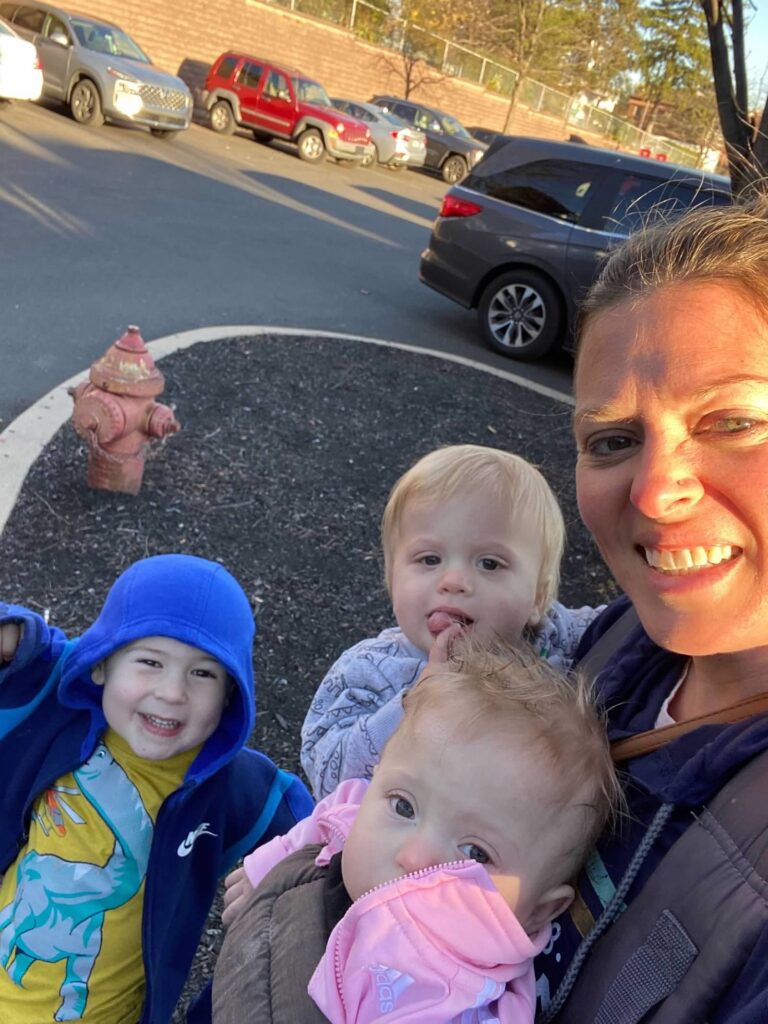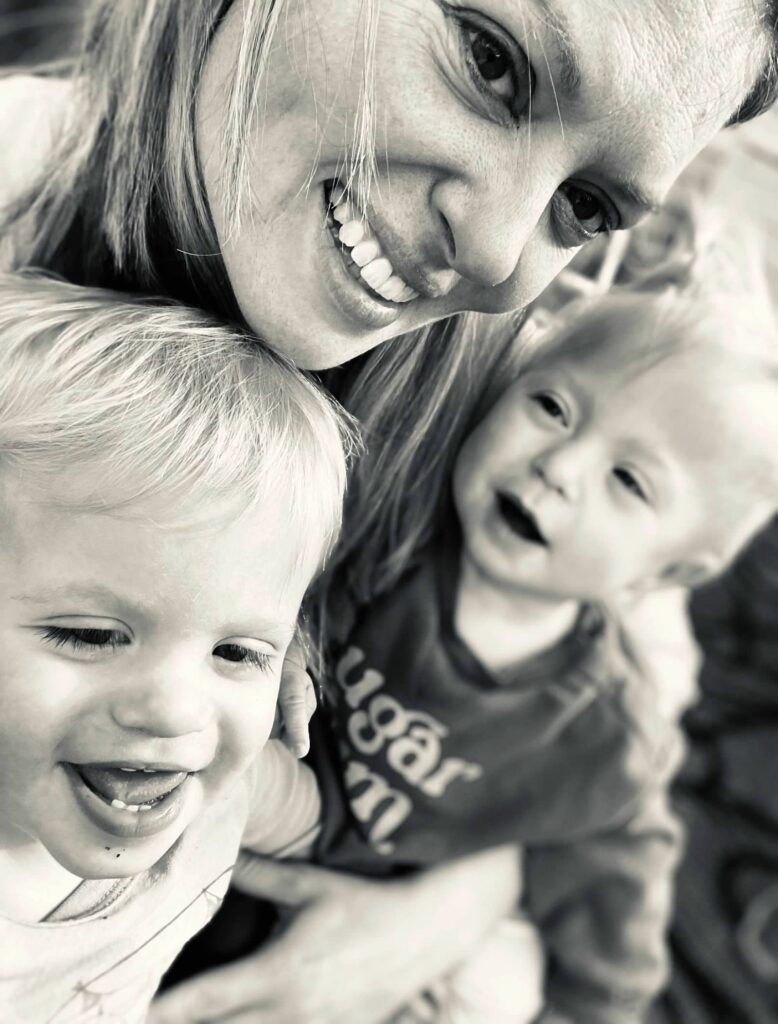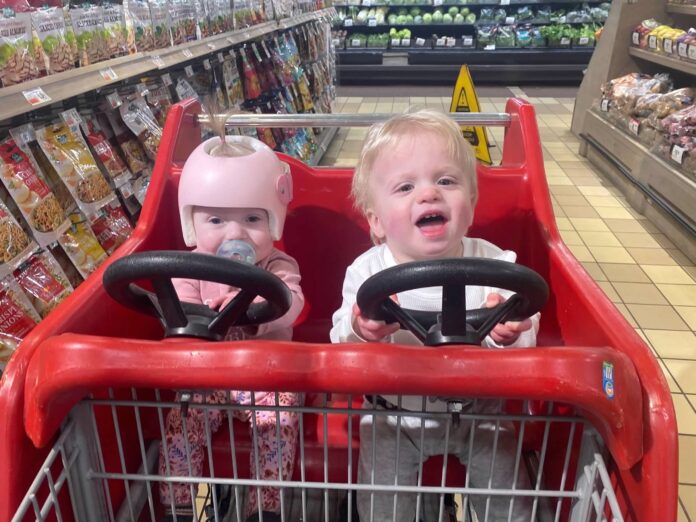As the spouse of a nurse, I’m managing the homefront, with its 4-year-old and 1-year-old twins, by myself for half the week. Which means that, if the fridge is running low, it’s off to the supermarket with the circus in tow.
On my first trip to Giant with three children 4 and under, I took pictures; now, I’ve got it down pat.
I cruise through the lot straight to the one spot for parents with toddlers (appreciated, but I’m going to get on my soapbox for all grocery stores to have multiples of these!). I’ve already scoped out the lines of carts in the lot for the extra-large kiddie carts that can fit two toddlers; if it’s not there, I say a silent prayer for one to be available inside because, if not, I’m screwed. Then it’s sliding open the minivan door to first help unbuckle Jackson (because, of course, the 4-year-old needs to be first!), then, with mutters about not running into traffic, heading around to the other side as I put the baby sling on my belly to grab Avery and clumsily wedge her on my front. Then we’re back around to unbuckle August and hug him on top of Avery’s head (it’s OK; she sat on his head for six months in the womb), grab Jackson’s hand and my purse and — taking a deep breath — running into the store in search of my coveted cart, crossing my fingers that the free fruit bin for kids is fully stocked.

A trip out on the town, or a supermarket (which is as close to fun that a parent of multiples can get), has to be calculated and well-paced, and even then there’s still bound to be a meltdown over a dropped sippy cup or a sibling tussle involving headlocks. Refereeing that madness while trying to restock our fridge means that I have very little patience for small talk with fellow shoppers; but, boy oh boy, does it always happen when the twins are in tow.
Twins — and higher-order multiples, I’m certainly imagining! — are a bit of an oddity. They’re naturally conceived in just about one of every 250 pregnancies, and the incidence of triplets, quads, etc. are much more rare. So, I appreciate that passersby want to satisfy their curiosity and get their double baby fix all at the same time by stopping me with questions and commentary. BUT, I implore you, fellow shoppers, please do not offer these insights, or ask these questions, of parents of multiples. While they may give you a polite smile, I’m guessing their sleep-deprived brains don’t find the banter all that endearing!
Here are the things about the twins I’m asked all the time by people:
1. You have your hands full.
Rarely can I leave the house with the twins and not hear this. And it’s an absolute guarantee when Jackson’s along. When I also have our dog with us, on a walk or on the way to the playground, I can almost say it for my neighbors before they open their mouth.
Yes, I am very well aware that I literally and figuratively have my hands full. I often have 14 pounds of Avery on my chest, pushing August in a stroller with one hand, holding the dog’s leash with the other and running through my neighborhood, chasing Jackson on his runaway scooter or bicycle, yelling about traffic safety. There is genuinely NO need for my well-meaning neighbors to point out the insanity. Parents of multiples know better than anyone else that they have their hands full, so highlighting it is akin to popping popcorn for your front-row seat at the trainwreck.
A better alternative? “You’re doing great!” or even “How about this weather?” Parents of littles, particularly of the same age, would love a banal distraction from the fact that they are parents of littles sometimes.
2. Why is she so much smaller?
Avery is 5 pounds lighter and about 5 inches shorter than August; after all, she was just over 1 pound at birth and he was three times her size at about 3 pounds. But, they’re still just two minutes apart in age and, undeniably, twins.
But that doesn’t stop the inquisitive well-wishers from wondering about the discrepancy: “Are they really twins?” Um. “Well, how much earlier was he born?” 120 seconds. “Is he a better eater?” Indeed!
Multiples, particularly if they’re fraternal like mine, are bound to have some differences. In fact, many fraternal twins, particularly dizygotic like mine (born from two separate eggs), look no similar or different than do siblings of different ages. Few people would likely question why my 4-year-old and his 1-year-old brother have different hair color, but are aghast at the differences between the twins.
Spotlighting the differences between twins — or among family members of any relation, biological or not — carries with it some significant assumptions about what a family should or shouldn’t look like. And the cliched saying about assumptions holds true here.
3. How are you sleeping?
We’re not. So, don’t ask, unless you intend to be at my house at 11 p.m., 1 a.m., 3 a.m., 4 a.m. and 5 a.m. for the wake-ups!
4. Do twins run in your family?
This is often an avenue for passersby to share their own stories about multiples, but it could easily put the parent into an uncomfortable situation.
For me, twins do run on both sides of my family (but I learned in twin parent school that it’s only the maternal side that counts!). My maternal grandmother had twin sons, my uncles, and everyone in my family has been waiting for that next set: Enter August and Avery!
While having twin relations on the maternal side is thought to significantly increase the chances of conceiving twins, so too can fertility treatments; so, if a parent doesn’t come from a long line of twins, they may feel forced to explain how their twosome came to be, and that’s only their business to decide to share. I often answer that, yes, I do have twins in the family but I also had to use a hormone through the IUI process that could increase the chance of double (or more) babies by 3% to 5%, so who really knows how it all happened. We’re lucky that ours was as painless as a fertility process can be, and I don’t mind sharing the details, but many parents aren’t so fortunate and shouldn’t be put in a position to share their story until they want to.
5. It gets easier.
Admittedly, in the last nearly five years since Ashlee and I became parents for the first time, I’m sure I’ve shared this advice with other new parents. In hindsight, I wish I hadn’t: No two kids, and no two families, are alike. While parents often share similar struggles, the timelines on which they happen and the ways in which they resolve can have vast differences.
For instance, Jackson’s sleeping habits hit their stride when he was about six months old, but many other kiddos struggle with sleep issues for months and even years longer. And his Terrible Twos were more like the Terrible Threes. So, any “it gets easier” advice I gave over the years was informed by our unique experience that can’t be applied to every family. And now with twins, I’m seeing this even more starkly. August’s sleeping, eating and behavior patterns are nothing like Jackson’s ever were, and Avery’s are just as different from both of them.
Especially with multiples, being told to just wait out the challenges can belie reality and provide false hope: My “easier” has certain complexities because of having two of the same age, and the next parents have their own nuances that will shape their experience.
Ultimately, connecting with and supporting parents of multiples or singletons (the best name, I believe!), those who are expecting, or those who have experienced loss, is an opportunity to recognize each parent’s unique journey and to give them space to own that experience. And with the right focus in the conversation, this can be a needed exercise for parents. Because as much as I may complain about grocery store shoppers stopping me to chat about my kids, I love every opportunity to brag about my brood and share a connection about the ups and downs of raising them. (Just not with anyone who tells me I have my hands full!)

